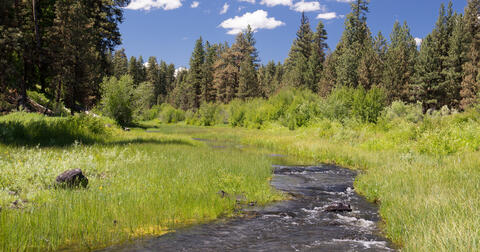SCOTUS case could bring uncertainty to Michigan water rights
Farmers in no-win situation in riparian rights case, experts say
The U.S. Supreme Court will soon decide a case that could have far-reaching ramifications for farmers, ranchers and landowners in Michigan. The case, Sackett v. EPA, comes in response to the Obama administration’s effort to expand a regulation known as the “Waters of the United States,” or WOTUS rule. The rule, according to the Environmental Protection Agency, “establishes the geographic scope of federal jurisdiction” under the Clean Water Act.
That expansion adds a host of areas to the EPA’s jurisdiction under the act, including small and intermittent streams, groundwater, and even — in some cases — farm fields. If the current version of the rule, which was just proposed by the Biden EPA, is finalized and approved, it could dramatically expand the federal government’s jurisdiction over water in the United States, including water on private property.
The Sackett family of Priest Lake, Idaho, purchased land to build on in 2004. The EPA told the family to stop construction, saying the land was in a federally protected wetland, so the construction would violate the Clean Water Act. The Sacketts have been in a dispute with the EPA for over 15 years as a result, according to the Pacific Legal Foundation, which is representing the family. The U.S. Supreme Court heard oral arguments in October.
If the court rules against the Sacketts, the effect could be less severe in Michigan than in other states, according to Laura Campbell, a regulatory specialist with the Michigan Farm Bureau. That’s because, Campbell says, “Michigan is one of three states with delegated authority to manage portions of the Clean Water Act.”
Campbell adds: “Being that Michigan already regulates most ditches, streams, ponds, and wetlands and assigns state agency staff to perform determinations, farmers here may not see many changes in the regulation of waterways on their farms.”
Campbell says that given the ambiguous wording of the rule, it’s possible that landowners here would still feel its impact. In addition, Michigan could always lose its delegated authority.
“So, not only could the federal agencies step in to override a state decision on regulations, they could take our state’s program away entirely,” Campbell say. “Farmers are in a no-win situation trying to figure out what they can and can’t do.”
Jason Hayes, environmental policy director at the Mackinac Center for Public Policy, agrees with the Michigan Farm Bureau’s take. He says:
The new rule could potentially expand the EPA’s power to supersede Michigan’s authority over portions of the Clean Water Act. If they do step in, there is no doubt that businesses and property owners will face increased uncertainty. Expansions of regulatory power often rely on new and obscure legal situations that will require years, if not decades, of litigation to establish clear definitions and policies.
However, until federal regulators decide how they'll enforce the new rule against a home owner or a farmer, or until they choose to refuse a permit approval for a business, it’s (at best) difficult to know the exact outcome.
And that obscure, sword-of-Damocles situation is exactly the sort of thing that the green groups supporting the changes to the rule want. They know businesses and property owners are more likely to restrict their activities or to seek out another location for a home, and office building, or industrial facility. If any are brave enough to test these legal waters, green groups are quite happy to employ their sizable war chests and legal staff to get any development activities stopped.
Michigan Capitol Confidential is the news source produced by the Mackinac Center for Public Policy. Michigan Capitol Confidential reports with a free-market news perspective.

